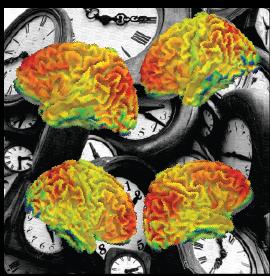
Credit: RIKEN
The neural ‘time windows’ in certain small brain areas contribute to the complex cognitive symptoms of autism, new research suggests. In a brain imaging study of adults, the severity of autistic symptoms was linked to how long these brain areas stored information. The differences in neural timescales may underlie features of autism like hypersensitivity and could be useful as a future diagnostic tool.
Sensory areas of the brain that receive input from the eyes, skin and muscles usually have shorter processing periods compared with higher-order areas that integrate information and control memory and decision-making. The new study, published in the journal eLife on February 5, shows that this hierarchy of intrinsic neural timescales is disrupted in autism. Atypical information processing in the brain is thought to underlie the repetitive behaviors and socio-communicational difficulties seen across the spectrum of autistic neurodevelopmental disorders (ASD), but this is one of the first indications that small-scale temporal dynamics could have an outsized effect.
Magnetic resonance imaging of the brains of high-functioning male adults with autism were compared to those of people without autism. In the resting state, both groups showed the expected pattern of longer timescales in frontal brain areas linked to executive control, and shorter timescales in sensory and motor areas. “Shorter timescales mean higher sensitivity in a particular brain region, and we found the most sensitive neural responses in those individuals with the most severe autistic symptoms,” says lead author Takamitsu Watanabe of the RIKEN Center for Brain Science. One brain area that displayed the opposite pattern was the right caudate, where the neural timescale was longer than normal, particularly in individuals with more severe repetitive, restricted behaviors. These differences in brain activity were also found in separate scans of autistic and neurotypical children.
The team of Japanese and UK researchers think that structural changes in small parts of the brain link these local dynamics to ASD symptoms. They found changes in grey matter volume in the areas with atypical neural timescales. A greater density of neurons can contribute to recurrent, repetitive neural activity patterns, which underlie the longer and shorter timescales observed in the right caudate and bilateral sensory/visual cortices, respectively. “The neural timescale is a measure of how predictable the activity is in a given brain region. The shorter timescales we observed in the autistic individuals suggest their brains have trouble holding onto and processing sensory input for as long as neurotypical people,” says Watanabe. “This may explain one prominent feature of autism, the great weight given by the brain to local sensory information and the resulting perceptual hypersensitivity.”
###
Reference
Watanabe T, Rees G, Masuda N (2019) Atypical intrinsic neural timescale in autism. eLife. doi: 10.7554/eLife.42256.
Media Contact
adam phillips
[email protected]
Original Source
https:/
Related Journal Article
http://dx.




